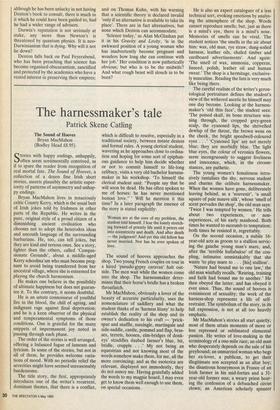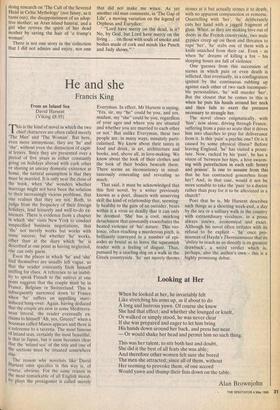The harnessmaker's tale
Patrick Skene Catling
The Sound of Hooves Bryan MacMahon (Bodley Head £8.95)
Stories with happy endings, unhappily, often seem sentimentally contrived, as if to spare the reader from recognition of real mortal fate. The Sound of Hooves, a collection of a dozen fine Irish short stories, asserts plausibly the artistic super- iority of patterns of asymmetry and unhap- py endings.
Bryan MacMahon lives in tenaciously celtic County Kerry, which is the usual butt of Irish jokes told by Irishmen in other parts of the Republic. He writes in the pure, original style of a proud citizen of a diminishing ancient civilisation who chooses not to adopt the heterodox ideas and uncouth language of the surrounding barbarians. He, too, can tell jokes, but they are kind and serious ones. See a story, lighter than the others, called 'Compas- sionate Grounds', about a middle-aged Kerry schoolma'am who must become preg- nant to avoid being transferred from her ancestral village, where she is esteemed for playing the church harmonium.
He makes one believe in the possibility of ultimate happiness but does not guaran- tee it. To the contrary, it seems doubtful.
He is an astute connoisseur of youthful fire in the blood, the chill of ageing, and indignant rage against final deprivation; and he is a keen observer of the physical and temperamental symptoms of those conditions. One is grateful for the many snippets of impermanent joy noted in .passing through each phase.
The order of the stories is well arranged, offering a balanced fugue of laments and lyricism. In some of the stories, but not in all of them, he provides welcome varia- tions of mood. With no periodic relief the severities might have seemed unreasonably burdensome.
The title story, the first, appropriately introduces one of the writer's recurrent, dominant themes, that there is a conflict, which is difficult to resolve, especially in a traditional society, between innate desires and formal rules. A young clerical student, wavering as he approaches close to ordina- tion and hoping for some sort of epiphan- ous guidance to help him decide whether or not to commit himself to life-long celibacy, visits a very old bachelor harness- maker in his workshop. 'To himself the clerical student said: "People say that he will soon be dead. He has often spoken to me of horses: he has never mentioned human love." ' Will he mention it this time? In a later paragraph the essence of the story is stated explicitly:
Woman are at the core of my problem, the student told himself. I fear the lonely stretch- ing forward of priestly life until it peters out into eccentricity and death. And after death — the judgment! And yet this old fellow has never married. Nor has he ever spoken of love.
The sound of hooves approaches the shop. Two young French couples on tour in a hired 'pseudo-gypsy caravan' halt out- side. The men wait while the women come into the shop. The harnessmaker deter- mines that their horse's bridle has a broken throatlatch.
Mr MacMahon, obviously a lover of the beauty of accurate particularity, uses the nomenclature of saddlery and what the student thinks of as 'harness litany' to help establish the reality of the shop and its owner's dedication to his craft — 'prick- spur and snaffle, surcingle, martingale and side-saddle, cantle, pommel and flap, bras- ses, terrets, hoosen, elm-bridges of donk- eys' straddles daubed farmer's blue, bit, bridle, crupple . . .' My not being an equestrian and not knowing most of the words somehow make them, for me, all the more convincing; and as the esoterica are relevant, displayed not immodestly, they do not annoy me. Having gratefully added the words to my magpie hoard, I may even get to know them well enough to use them, on special occasions. He is also an expert cataloguer of a less technical sort, evoking emotions by analys- ing the atmosphere of the shop. Words cannot reproduce smells; but, just as there is a mind's eye, there is a mind's nose.
Memories of smells can be vivid. The student notices `the smells in the air about him: wax, old man, rye straw, dung-soiled harness, leather oils, chafed timber and cardboard advertisements'. And again: 'The smell of wax, ammonia, copperas, linseed, polish, leather oil and human sweat.' The shop is a hermitage, exclusive- ly masculine. Reading the lists is very much like being there.
The careful realism of the writer's geron- tological portraiture defines the student's view of the withered ascetic he himself may one day become. Looking at the harness- maker's 'old thin face', the student sees: The poised skull, its bone structure win- ning through, the cropped grey-green scalp, the cyanosed lips, the shrivelled dewlap of the throat, the brown wens on the cheek, the bright speedwell-coloured eyes . . ."Cyanosed lips' are not merely blue; they are morbidly blue. The light blue eyes, the colour of veronica flowers, seem incongruously to suggest liveliness and innocence, which, in the circum- stances, are pathetic.
The young women's femaleness intru- sively tantalises the shy, nervous student and charms the celibate harnessmaker. When the women have gone, deliberately leaving behind, as a 'souvenir', 'a small square of pale mauve silk', whose 'smell of scent pervades the shop', the old man says: 'Twice I was tempted by women.' He tells about two experiences, or non- experiences, of his early manhood. Both times he wanted to succumb to temptation; both times he resisted it, regrettably.
On the second occasion, a nubile 16- year-old acts as groom to a stallion servic- ing the gauche young man's mare, and, after the 'terrible hullabaloo' of the cou- pling, intimates unmistakably that she wants `to play mare to . . . [his] stallion'.
'Nature had bound me to one law,' the old man wistfully recalls. 'Rearing, training and faith had bound me to another.' He then obeyed the latter, and has obeyed it ever since. Thus, the sound of hooves is reminiscent of sexuality; the work of the harness-shop represents a life of self- restraint. The symbolism of the story, in its full expression, is not at all too heavily emphatic.
Mr MacMahon's stories all start quietly; most of them attain moments of more or less repressed or sublimated elemental passion. He writes of love-making in the terminology of a one-mile race; an old man who desperately depends on the sale of his greyhound; an unmarried woman who begs her ex-lover, a publican, to get their illegitimate son accepted as an altar boy; the disastrous honeymoon in France of an Irish farmer in his mid-forties and a 31- year-old former nun; a weary priest hear- ing the confession of a debauched circus clown; an American scholarly spinster doing research on 'The Cult of the Severed Head in Celtic Mythology' (not funny, as it turns out); the disappointment of an adop- tive mother; an Aran island funeral, and a girl who revives the spirit of her dead mother by saving the hair of 'a tramp's woman'.
There is not one story in the collection that I did not admire and enjoy, nor one that did not make me wince. As yet another old man comments, in 'The Gap of Life', a moving variation on the legend of Orpheus and Eurydice: '"Lord have mercy on the dead, is it? No, by God, but Lord have mercy on the living. . . on those with souls of smoke and bodies made of cork and minds like Punch and Judy shows." '



















































 Previous page
Previous page